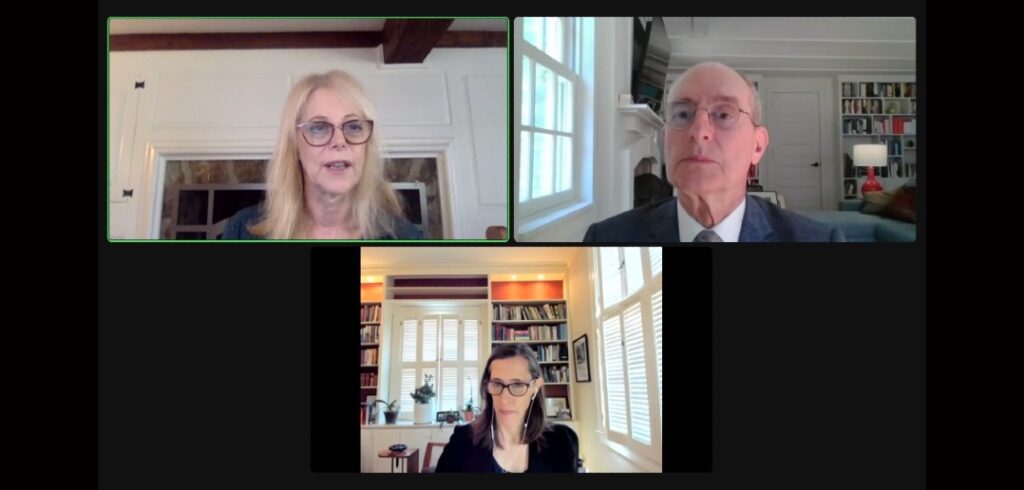On March 18, the Center on National Security (CNS) at Fordham Law brought together two prominent international law experts, Oona Hathaway and Gabor Rona, to discuss the ongoing armed conflict in Ukraine. The virtual panel, titled “Crimes of Aggression, Crimes against Humanity and War Crimes in Ukraine,” looked at the recent events in Ukraine through the legal context of Russia’s unprovoked invasion of the country, which began on Feb. 24.
CNS Director Karen J. Greenberg, who served as moderator, explained that the International Criminal Court (ICC) called for an investigation into Russia’s actions on March 2 and that the International Court of Justice (ICJ) ordered Russia on March 16 to “immediately suspend” military operations in Ukraine.
“In quite profound ways, we are seeing the confrontation between brute force and the rule of law, something that those of us who studied the War on Terror have been witnessing in other forms for decades now,” said Greenberg. “What role can law play, how powerful are the laws and institutions we’ve created, and are they able to prevent war, carnage, suffering, and other things that we’ve seen for the past [several] weeks now?”
A Legal Understanding of “The Crime of Aggression”
Hathaway, the Gerard C. and Bernice Latrobe Smith Professor of International Law at Yale Law School, noted that when it comes to the war in Ukraine, two separate bodies of law are involved.
The first, she explained, is known as jus ad bellum, which outlines when it is lawful for a state to resort to force and is governed by Article 2(4) of the United Nations Charter. The second body of law, known as jus in bello, governs what states can do once they are already involved in an active conflict.
“One of the key principles of the jus in bello is the prohibition of targeting civilians, for instance,” said Hathaway. “And when there are serious violations of jus in bello in international humanitarian law, those can be prosecuted as war crimes.”
However, as Hathaway noted, the crime of aggression can only be prosecuted by the ICC when states are party to the Rome Statute, which is not true of either Russia or Ukraine.
“There would have to be a separate, new special tribunal set up to prosecute the crime of aggression [in this case],” Hathaway said. “That’s why you hear some talk about setting up a hybrid tribunal to be allowed under the auspices of the General Assembly or some other way to prosecute this crime of aggression.”
Evidence of War Crimes and Crimes Against Humanity
Greenberg went on to ask Rona, a professor at Cardozo Law School and the former International Legal Director of Human Rights First, about the evidence of war crimes and crimes against humanity that have been witnessed in Ukraine, citing news reports of attacks on health care facilities, maternity wards, and schools that have left hundreds of civilians dead and even more wounded since the beginning of the invasion.
Rona described some of the main principles that define the laws of war, including the notion of military necessity (only targeting objects that weaken the enemy’s forces) and the principle of distinction (distinguishing between combatants and civilians).
He also discussed why this armed conflict in particular is so significant and why the international community has had such a robust response so far, including a resolution from the United Nations General Assembly condemning the attack.
“[This is the] first time in the history of the United Nations that the General Assembly has condemned a violation of the most fundamental aspects of the UN Charter—the prohibition of the use of force—in connection with one of the permanent members of the Security Council,” said Rona.
These actions represent a challenge to “the international rules-based order,” according to Rona. “I think that separates the reasons for the extremely broad, deep, and shockingly immediate response of the international community to this violation, from other atrocities committed in other conflicts,” he said.
The Role of International Law
Hathaway and Rona discussed what impact a ruling from the ICJ could have in ordering Russia to suspend any use of force in Ukraine. Hathaway argued that international law can play a crucial part in the conflict, even if enforceability remains an open question.
“One of the key roles that international law can play is setting a shared expectation for behavior by states and a set of rules that everybody agrees to abide by—and then agreeing that when those rules are violated there are going to be some consequences,” she said.
“It plays a role in making arguments at the diplomatic level about how states should and shouldn’t behave in response to a state that’s so openly breaking the most fundamental rules of the system.”

